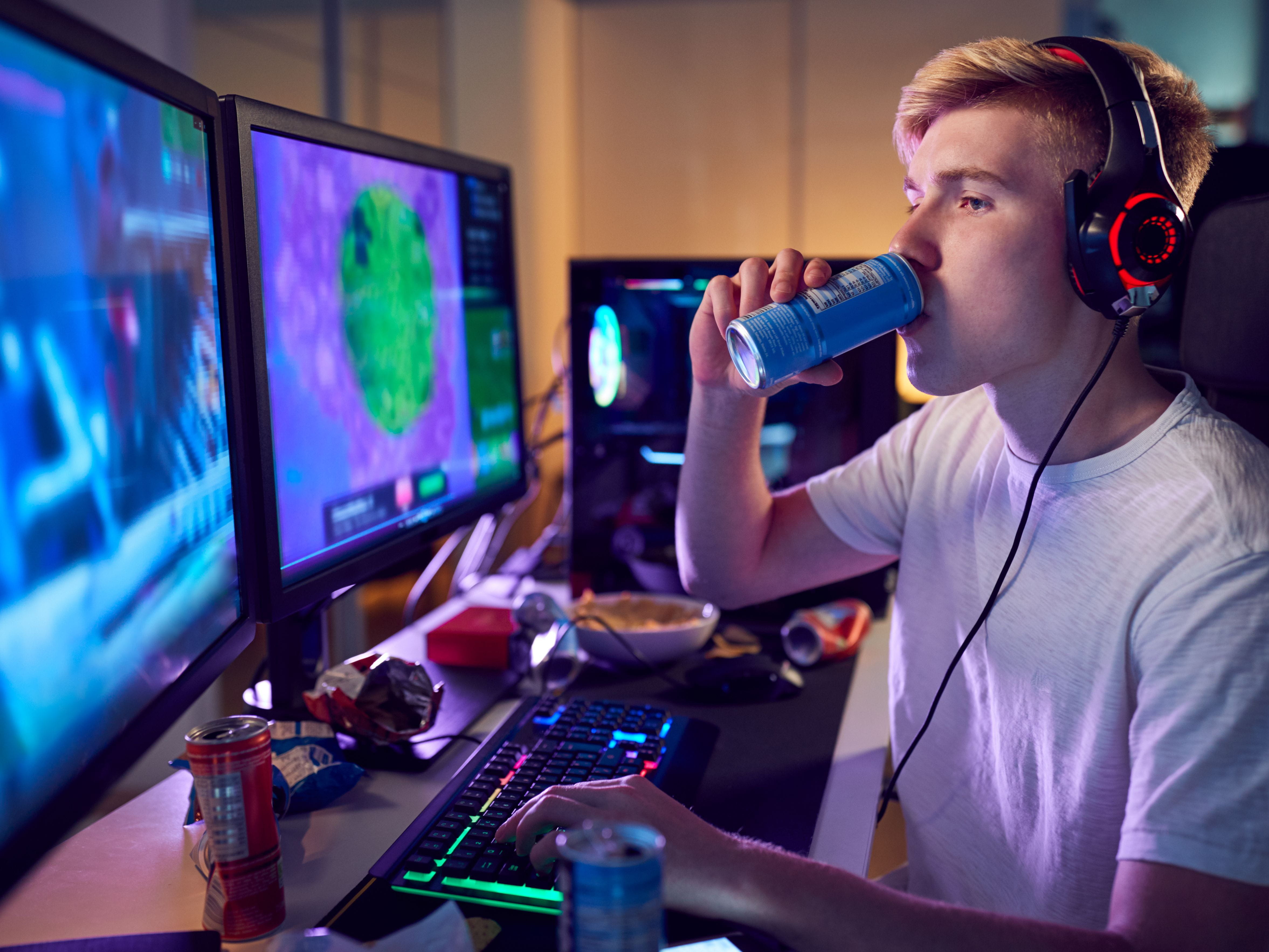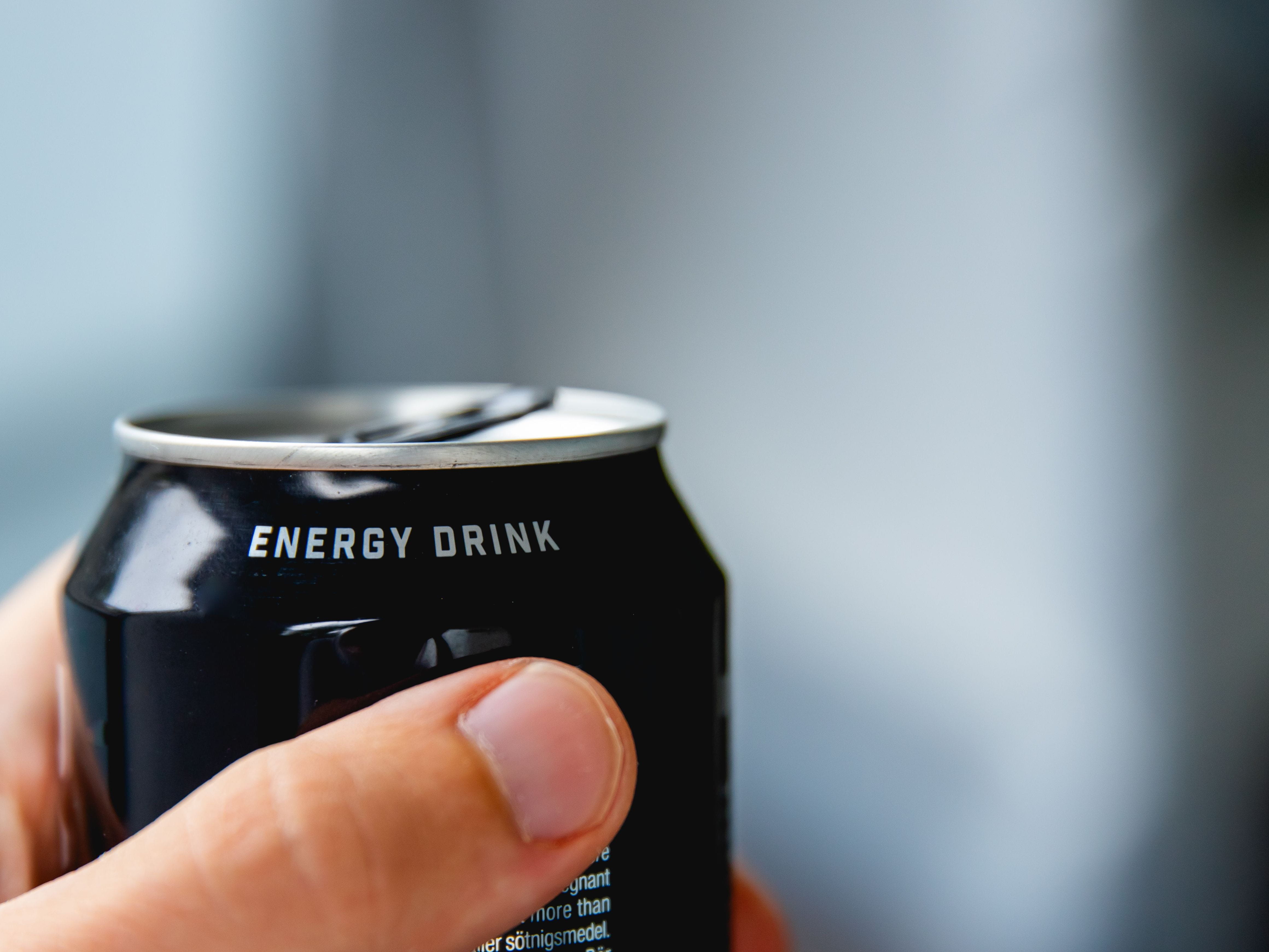Are Energy Drinks Dangerous?

The Bottom Line
Caffeine is a stimulant found in everyday beverages, such as soda and coffee. In recent years, energy drinks containing large amounts of caffeine and other herbal stimulants have become increasingly common on store shelves. While caffeine is generally safe in moderation, consuming large amounts of caffeine can be dangerous.

What are energy drinks?
Energy drinks are beverages that are marketed as stimulants to help you stay awake or improve concentration. They often contain large amounts of caffeine, and sometimes other herbal stimulants such as taurine and guarana. In addition, they may also contain large amounts of sugars. Lower calorie versions may contain artificial sweeteners. Energy drinks are different than sports drinks in that sports drinks are generally meant to replenish fluids and electrolytes, and they do not contain caffeine or other stimulants.Are energy drinks bad for you?
While it is generally safe for a healthy adult to have an occasional energy drink, regular consumption may be dangerous. This is because the caffeine and other ingredients found in energy drinks can raise your heart rate and blood pressure, which is not healthy in the long term. Caffeine can also lead to problems sleeping. Additionally, some energy drinks contain a lot of sugar, which can contribute to weight gain. When someone consumes too many energy drinks all at once, they are at risk for caffeine toxicity.Are energy drinks safe for kids?
Energy drinks are not recommended by the American Academy of Pediatrics and the FDA has not recommended a safe amount of caffeine intake for children and adolescents. Outside of the caffeine content, energy drinks are also not really part of a healthy diet given the amount of sugar and calories they contain. It is important for parents to discuss the dangers of consuming too much caffeine with their children and teens, particularly as many of these beverages have packaging and flavors that appeal to children and adolescents.How many energy drinks are too many? Can you overdose on energy drinks?
It is possible to overdose on energy drinks. It is important to remember the amount of caffeine in soda or coffee is a fraction of what is in some energy drinks currently on the market. For example, depending on the brand, a 12 oz. can of soda contains about 30-50 mg of caffeine. An average cup of coffee has about 100 mg. Energy drinks can contain 150-300 mg of caffeine per serving. The FDA has stated that 400 mg of caffeine is considered safe for an adult to consume.
So, if someone were to consume 2 energy drinks in one sitting (which would be the equivalent of around 6 cups of coffee), they could be consuming a potentially toxic amount of caffeine. Some energy drinks also contain additional herbal stimulant mixtures that can have synergistic effects with caffeine, further increasing the risk of toxicity.
Risks and symptoms associated with over-caffeination
Symptoms of caffeine toxicity include tremors, restlessness, gastrointestinal upset, and heart palpitations. More severe symptoms can include severe agitation, dehydration, electrolyte abnormalities, muscle breakdown, kidney injury, seizures, and abnormal heart rhythms. Deaths have been reported when very large amounts of caffeine have been ingested. Even though media publicity has focused on children and adolescents consuming these drinks, they can be even more dangerous to adults, particularly those with underlying heart problems. Additionally, long-term, heavy caffeine use can result in caffeine withdrawal symptoms, such as headache, fatigue, irritability, difficulty concentrating, malaise, and constipation, when you try to stop taking it.Do energy drinks have any health benefits?
Caffeine can promote alertness and focus, which can be helpful in staying awake and performing tasks. However, the amount present in energy drinks is often in excess of what is needed for this purpose.
Other ingredients to be aware of
Other stimulants can be found in energy drinks that can have synergistic effects with caffeine. These include compounds such as taurine, guarana, green tea extract, and vitamins. Often the ingredients are listed as proprietary mixtures and the amounts are not listed.
Having an adverse reaction to an energy drink? Here’s what to do.
Feeling jittery, mild palpitations, or anxiety can often be managed at home. However, sometimes severe complications such as seizures or abnormal heart rhythms can occur. Those require immediate medical attention.
If someone is having an adverse effect from an energy drink, help from experts is available through the webPOISONCONTROL online tool and by phone at 1-800-222-1222. Poison Control’s expert guidance is always free, confidential, and available 24 hours a day.
Maryann Amirshahi, PharmD, MD, MPH, PhD
Medical Toxicologist
Poison Control Media Information
Did you find this page helpful? If so, we need your support. Poison Control is in constant competition with misinformation online. Links to www.poison.org or our webPOISONCONTROL triage tool from other websites and blogs help internet searchers quickly find accurate information and Poison Control’s contact information in an emergency. If you use the content from this page, please provide attribution via a link back to this page, www.poison.org, or https://triage.webpoisoncontrol.org/#!/exclusions. By doing so, you could save a life. Thank you!
Poisoned?
Call 1-800-222-1222 or
Prevention Tips
- Avoid consumption of energy drinks if you have any heart problems.
- If you are going to consume an energy drink, limit it to just 1.
- Do not consume energy drinks on a daily basis.
- If energy drinks are in the home, store them up and away from children.
- Discuss with children and adolescents the risks associated with consumption of energy drinks.
- Provide healthy beverage options for children and adolescents.
This Really Happened
Case 1. A 48-year-old woman tried an energy drink for the first time that was being served with a work lunch. Shortly after consuming the energy drink, she had had some abdominal cramping, palpitations, and felt generally unwell. She drank extra water but continued to feel bad for several hours and does not consume energy drinks anymore.
Case 2. A 16-year-old boy ingested 2 energy drinks before school because he was tired. He was brought to the emergency department from school because he was lightheaded and disoriented and was complaining of chest pain. In the emergency department, he was noted to have an elevated heart rate and a tremor. He was given intravenous fluids and medications to calm him down. He spent the remainder of the day in the emergency department, but was ultimately discharged home.
Case 3. A 36-year-old man ingested 7 energy drinks in a suicide attempt and was brought to the emergency department. He had an elevated heart rate, was dehydrated and had low potassium. He was noted to be very agitated, requiring sedation. He spent a day being monitored in the hospital before receiving treatment for his depression.
For More Information
American Academy of Child and Adolescent Psychiatry. Caffeine and children. https://www.aacap.org/AACAP/Families_and_Youth/Facts_for_Families/FFF-Guide/Caffeine_and_Children-131.aspx
American Academy of Pediatrics. Children should avoid drinks with sugar and caffeine. https://publications.aap.org/aapnews/news/27276/Children-should-avoid-drinks-with-sugar-caffeine
Centers for Disease Control and Prevention (CDC). The buzz on energy drinks. https://www.cdc.gov/healthyschools/nutrition/energy.htm
National Center for Complementary and Integrative Health. Energy drinks. https://www.nccih.nih.gov/health/energy-drinks
References
Azarm V, Link JP, Mandilaras G, Li P, Dalla-Pozza R, Jakob A, Haas NA, Oberhoffer FS, Schrader M. Acute Cardiovascular Effects of Simultaneous Energy Drink and Alcohol Consumption in Young Adults: A Review of Case Reports. Pediatr Rep. 2024 Jul 29;16(3):618-630.Committee on Nutrition and the Council on Sports Medicine and Fitness. Sports drinks and energy drinks for children and adolescents: are they appropriate? Pediatrics. 2011 Jun;127(6):1182-9. doi: 10.1542/peds.2011-0965.
Evans J, Richards JR, Battisti AS. Caffeine. 2024 May 29. In: StatPearls [Internet]. Treasure Island (FL): StatPearls Publishing; 2024 Jan–.
Pomeranz JL, Munsell CR, Harris JL. Energy drinks: an emerging public health hazard for youth. Journal of Public Health Policy. 2013;34(2):254–271.
Rostami M, Babashahi M, Ramezani S, Dastgerdizad H. A scoping review of policies related to reducing energy drink consumption in children. BMC Public Health. 2024 Aug 26;24(1):2308.
Seifert SM, Schaechter JL, Hershorin ER, Lipshultz SE. Health effects of energy drinks on children, adolescents, and young adults. Pediatrics. 2011:127(3), 511-528.
Walia R, Kaur S. Excess of high-caffeinated energy drinks causing ventricular arrhythmias. J Family Med Prim Care. 2024 Aug;13(8):3424-3426.
Poisoned?
Call 1-800-222-1222 or
Prevention Tips
- Avoid consumption of energy drinks if you have any heart problems.
- If you are going to consume an energy drink, limit it to just 1.
- Do not consume energy drinks on a daily basis.
- If energy drinks are in the home, store them up and away from children.
- Discuss with children and adolescents the risks associated with consumption of energy drinks.
- Provide healthy beverage options for children and adolescents.
This Really Happened
Case 1. A 48-year-old woman tried an energy drink for the first time that was being served with a work lunch. Shortly after consuming the energy drink, she had had some abdominal cramping, palpitations, and felt generally unwell. She drank extra water but continued to feel bad for several hours and does not consume energy drinks anymore.
Case 2. A 16-year-old boy ingested 2 energy drinks before school because he was tired. He was brought to the emergency department from school because he was lightheaded and disoriented and was complaining of chest pain. In the emergency department, he was noted to have an elevated heart rate and a tremor. He was given intravenous fluids and medications to calm him down. He spent the remainder of the day in the emergency department, but was ultimately discharged home.
Case 3. A 36-year-old man ingested 7 energy drinks in a suicide attempt and was brought to the emergency department. He had an elevated heart rate, was dehydrated and had low potassium. He was noted to be very agitated, requiring sedation. He spent a day being monitored in the hospital before receiving treatment for his depression.
